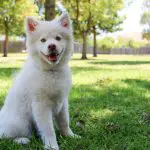The bulldogs world traveling ancestor
Bulldog information is incomplete without a retelling of its ties to the ancient world. The Bulldog’s sturdy build was inherited from its ferocious ancestor, the Molossian of Greece. Kept and bred by the Molossi tribes’ people, the huge dog was valued for its great strength and size. Even though the dog did not have speed or a sensitive sense of smell, the dog had the courage to go after prey that would not back down.
Huge dogs, such as the Molossian, were used for hunting large game in prehistoric Europe, Africa and Asia. Originally from Epirus, Greece, the Bulldog’s ancestor, the Molossian, was kept for hunting purposes and eventually became a guard dog and fighting dog. A strong based on mutual need developed between the dog and its human family. The dog became an indispensable member of the household and earned a living through the work that it performed for its human masters.
An interesting tidbit of Bulldog information and mythology concerns the role of the gods in the Bulldog prehistoric past. The history of the Molossians has been lost in time although it is believed that the origin of the breed is associated with Epirus, Greece. A Greek myth tells of the master forger Hephaestus who created a Demonesian bronze dog. Hephaestus gave the bronze dog it’s own soul. Zeus received Laeleps as a gift and through time, the dog had different owners until it turned to stone. Before Laeleps turned to stone, he fathered many descendants, of whom the Mollosian were descended.
The Greek Molossi tribes bred dogs known as the Molossians. The Molossi trained the dogs as guard and war dogs. The early name of this dog is Canis Molossi. During the ancient Greek era, the Phoenicians, who were important traders, traded with the Molossi as a bargaining item. The Phoenicians came to regard the huge dogs to be a highly valuable commodity for trade. In this way, the Molossians made their way to Briton about 800 BC.
Historical Bulldog information tells of British tribes people, including the Celts, breeding the dog for their own purposes. The Celtic tribes bred the dog so that it could accompany them on their wild boar and wild cattle hunts. The Celtic and British tribes trained the dog to participate in war and the dogs had skill at bringing a horseman down. The Romans called these dogs by the name Pugnace Britannicii or Canis Pugnax. A later name used for the dog was the Broad Mouthed Dogs of Briton.
The Pugnace would grab a horse by the nose and by clinging on the horse would buck its rider off in an attempt to dislodge the dog. This canine maneuver was a surprise to the Romans when they first invaded the British homelands. The Romans prized the dog’s ferocious nature and put it in the arena as a combatant. Since this time, the dog’s ferocity has been bred out so that what remains is a good natured and an even comical companion.


